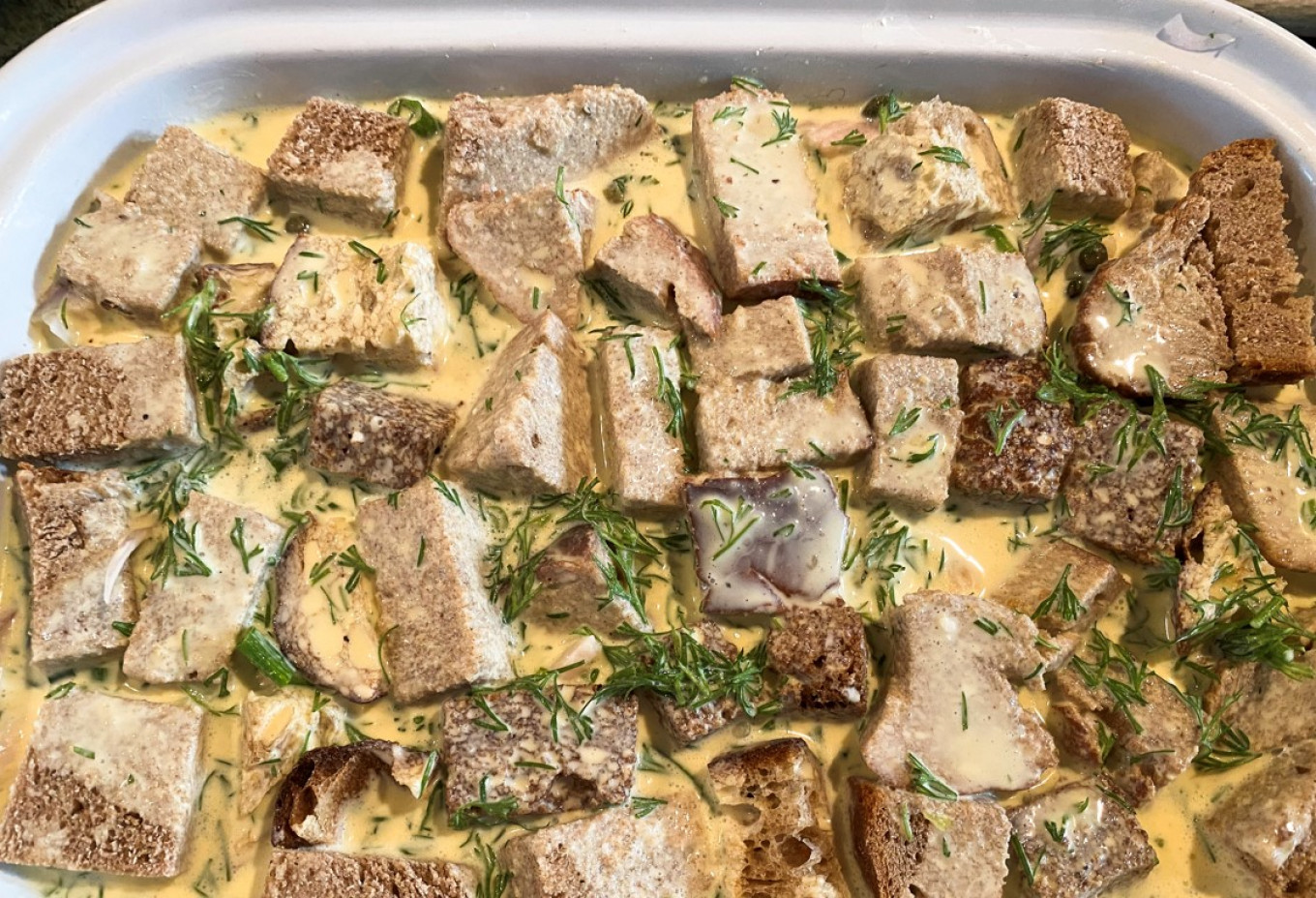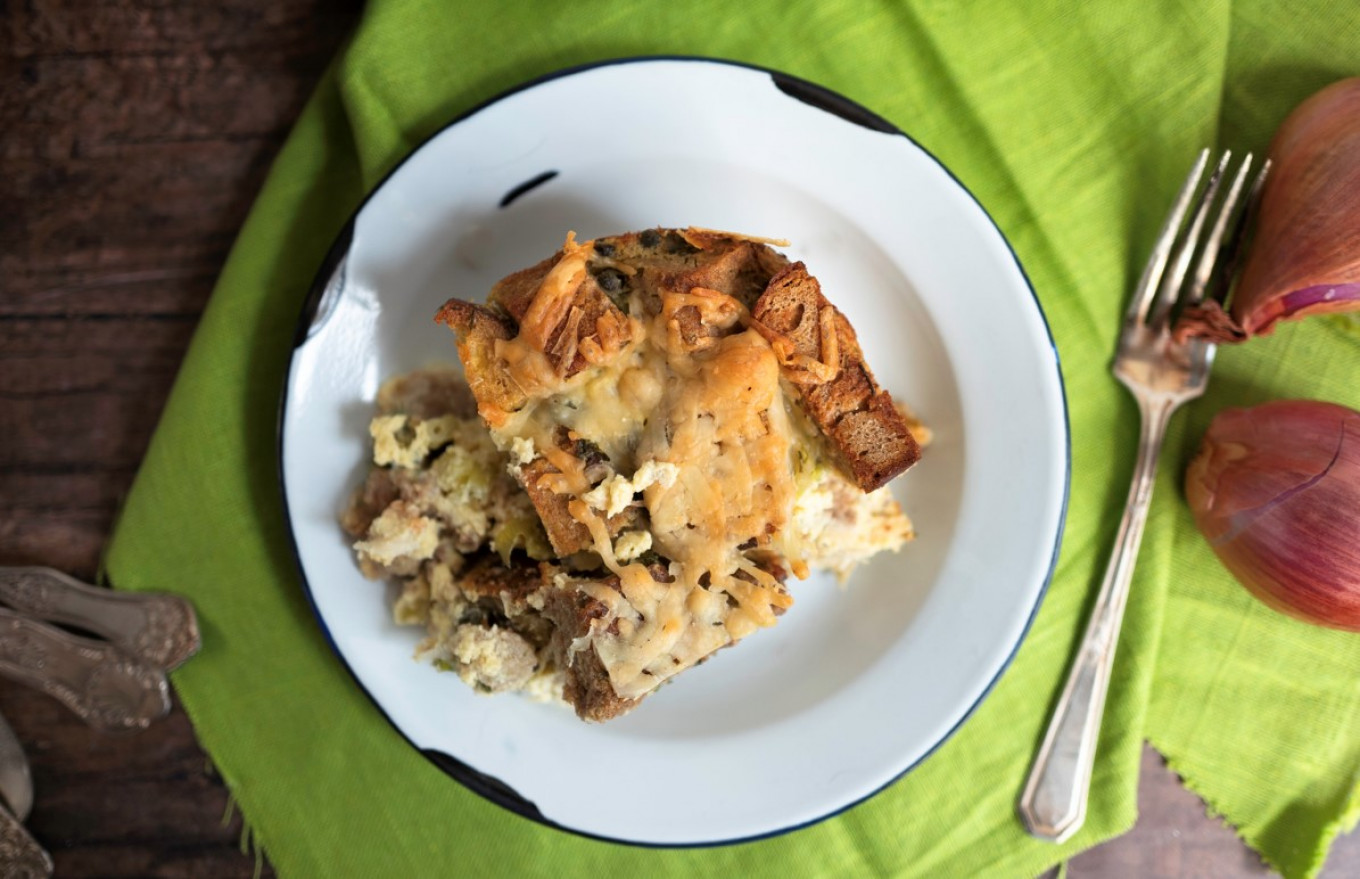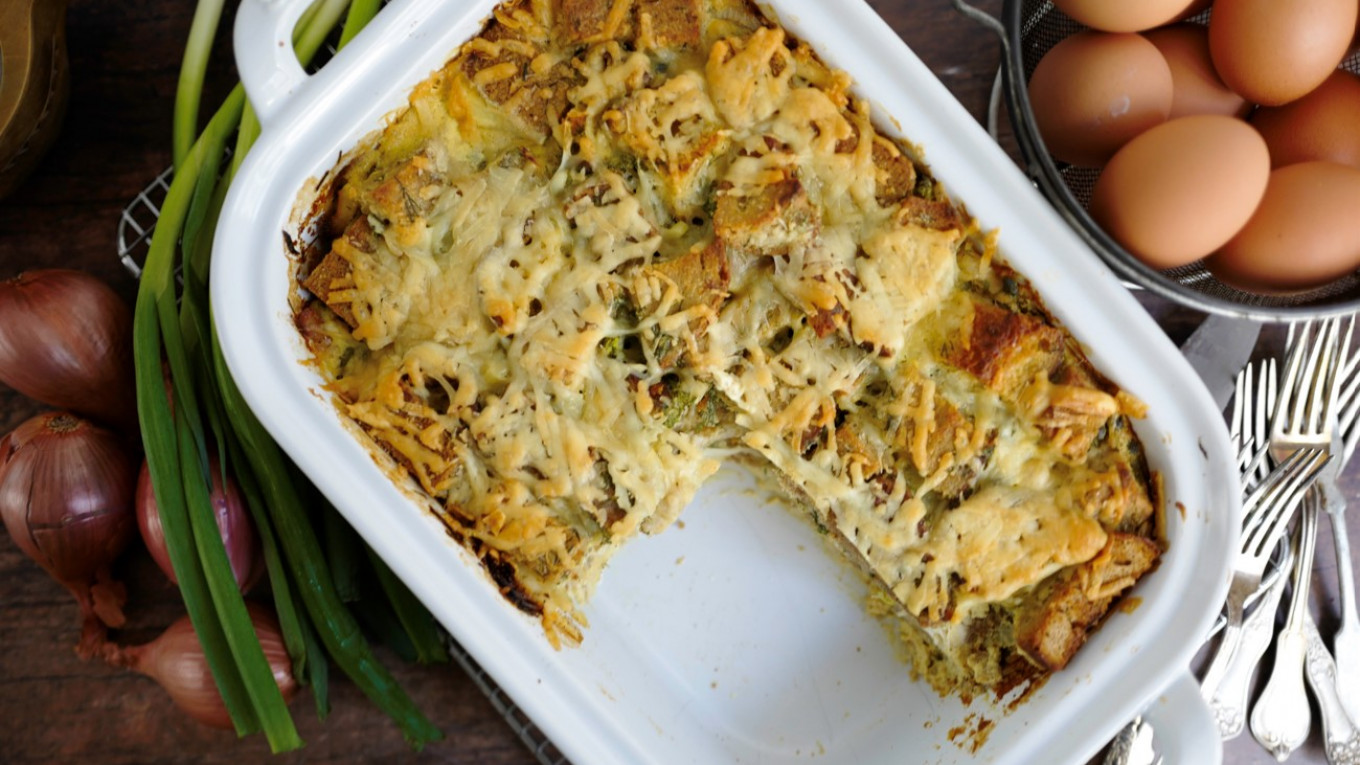Everyone needs a failsafe strata recipe in their arsenal, particularly at festive times of the year, or, indeed, any time when your home is visited by hordes of people. This thrifty turn-of-the-century version of bread pudding is one of the best ways to feed a large group of people easily, cheaply, and with minimal fuss for maximum effect.
“Strata” of course, refers to “layers,” which is the architecture of a strata: cubes of toasted or day-old (or, let’s be honest, stale) bread are layered with something like mushrooms, ham, or sausage, and cheese, then the entire construction is flooded with a creamy custard mixture of eggs, milk, and in my case: sour cream. Strata made a triumphant comeback in the 1980s when Julee Rosso and Sheila Lukins included it in one of their bestselling “Silver Palate” cookbooks, which is when my family made it the centerpiece of Christmas or Boxing Day — or both. It is the perfect “blotting paper” if a festive brunch is boozy or if you’ve overdone the festivities the night before: it puts you right back on the map. Strata’s great appeal for me is that I can assemble it in advance, then let it have a nice long soak overnight, needing only to pop it into the oven the next morning, and voila! I’m the hostess with the mostess!
Strata was exclusively entertainment or holiday fare until 2017, when my husband and I lived for several months in Riga, the capital of Latvia. For someone interested in food, Vikings, and Medieval architecture, this was a dream come true. I did not wait to unpack, but headed straight to Riga’s renowned Central Market, which dates back to the Hanseatic League, but today is famously housed in three cavernous World War II airline hangers. It was reassuringly enough like my favorite Moscow markets to make me feel right at home with its golden-teethed butchers slamming entire sides of lamb onto filthy butcher blocks, rosy-cheeked women in starched aprons over their nylon parkas selling thick sour cream and rich butter, and an entire room dedicated to salted and smoked fish. But there were new treats in store as well, such as the delectable quince syrup, a curious elixir called “balsam,” and the astonishingly large loaves of dense, sour rye bread, which are a hallmark of Latvian cuisine.

At first, my husband and I struggled to get through even half of a loaf of Latvian rye before it started to harden. But as I began to know Riga’s foodies better, I learned the many ways these quietly innovative and creative people parlay their leftover bread before it goes stale: into rusks, breadcrumbs, croutons, and most deliciously into delectable bread pudding desserts. It was then that I began to play around with these ideas in my own Riga kitchen, and that is how this version of strata evolved. While I’ve enjoyed it with ham and sausage, I find that flakes of oily smoked fish, briny capers, and tart shallots and scallions offer the best contrast to the unique taste of Riga’s dense, sour, and truly marvelous rye bread.
What follows is perhaps not so much as recipe, as much as a love letter to Riga’s wonderful food culture, which makes every day a holiday.

Riga Rye Bread and Smoked Fish Strata
Ingredients
- 1 Tbsp butter
- 1-¼ lbs. (550 grams) dense rye bread, cut into 1-inch cubes
- 10-oz (285 grams) sour cream
- 7 eggs, room temperature
- 2-½ (590 ml) cups whole milk, heated to 105ºF
- ¼-cup (60 ml) fresh dill
- 1 tsp white pepper
- 1 shallot, finely sliced
- 5 scallions, finely sliced
- ¼-cup (60 ml) capers
- 8 oz (250 grams) smoked fish such as salmon, whitefish, mackerel, with the skin and bones removed, lightly flaked
- ⅔-cup (160 ml) grated hard cheese such as Grand Padano or Asiago
Instructions
- Preheat the oven to 275ºF (135ºC) Arrange the bread cubes on a baking sheet and toast them for 20 minutes. Butter a 9x13” (3.3 liter) casserole dish.
- Whisk together the eggs, milk, sour cream, white pepper, and dill.
- Arrange half of the bread cubes on the bottom of the casserole and pour one third of the sour cream mixture over them. Use the back of a wooden spoon to press the bread down into the liquid. Layer the shallots, scallions, capers, and fish on top of the first layer, then arrange the remaining bread on top. Pour the remainder of the sour cream mixture on top of the casserole and press down with the wooden spoon.
- Cover the casserole and let it rest for 1-2 hours. The bread will soak up much, but not all of the liquid. If the bread has absorbed all of the liquid, combine ¾-cup of milk, one egg, and ¼-cup of sour cream, and pour on top. You can let the casserole sit uncooked overnight but be sure to refrigerate it and allow it to come to room temperature before you bake it.
- Preheat the oven to 375ºF (190ºC). Cook uncovered for 45 minutes. Scatter the cheese on top and cook for a final 10 minutes. Let the strata cool for 15 minutes before serving.

A Message from The Moscow Times:
Dear readers,
We are facing unprecedented challenges. Russia's Prosecutor General's Office has designated The Moscow Times as an "undesirable" organization, criminalizing our work and putting our staff at risk of prosecution. This follows our earlier unjust labeling as a "foreign agent."
These actions are direct attempts to silence independent journalism in Russia. The authorities claim our work "discredits the decisions of the Russian leadership." We see things differently: we strive to provide accurate, unbiased reporting on Russia.
We, the journalists of The Moscow Times, refuse to be silenced. But to continue our work, we need your help.
Your support, no matter how small, makes a world of difference. If you can, please support us monthly starting from just $2. It's quick to set up, and every contribution makes a significant impact.
By supporting The Moscow Times, you're defending open, independent journalism in the face of repression. Thank you for standing with us.
Remind me later.







